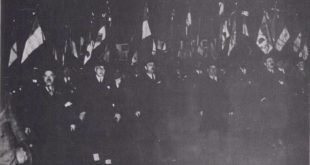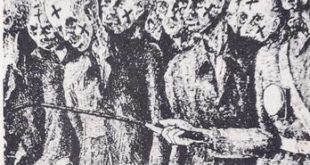So at last, in the Pacific as in Europe, the guns were silent; the nations that had brought so much death and destruction to the world had been defeated, but victory alone was not enough. Governments had to be set up for the defeated nations, the destruction of war had to be repaired, hungry people had to be fed, industry and commerce had to be set in motion. Even more important, a way had to be found to keep war out of the world, to settle disputes between nations by peaceful means rather than by violence. The League of Nations, …
Read More »Victory in the Pacific 1941 – 1945
On June 25, 1940, the Japanese war minister said, “The present international situation is developing in a manner advantageous to Japan’s national policy. We should not miss the present opportunity. . . Japan’s national policy was scarcely a secret. It had already linked itself by treaty to the aggressor nations of Germany and Italy – for several years it had been fighting an undeclared war against China. Although Chinese guerrilla forces were fighting back the Japanese controlled most of the Chinese railroads and held such cities as Peiping, Shanghai and Canton. They planned to establish something they called the “Greater …
Read More »A World at War 1939 – 1941
Now the people of Europe began to hear a new sound, a sound that would haunt them throughout the years of war — the wail and shriek of air-raid sirens. At night, the lights of Europe went out and the “blackout” made familiar streets strange places of darkness. Street lamps were left unlit and windows were covered with heavy draperies. Any stray gleam of light might help guide enemy bombers to their targets. Hurrying about their wartime duties, the people of Britain and France began to wonder. They had not wanted war and yet war had come. Why? What had …
Read More »Totalitarianism Versus Democracy
AS THE 1930’s drew to a close, only eight countries in Europe, besides Great Britain and France, were still democracies. They were Belgium, Holland, Switzerland, Czechoslovakia, Norway, Sweden, Denmark and Finland. Three of Europe’s most important nations were dictatorships. The Soviet Union was communist; Germany and Italy were fascist. There had been dictatorships before, but these went further; they were totalitarian. The word “totalitarian” comes from the word “total,” and total control is what these dictatorships were after — total control of their people, total control of their actions and thought. There were differences between the totalitarian countries. While Stalin …
Read More »Democratic but Divided 1926-1939
UNLIKE Britain, France was not a highly industrialized country; its economy was fairly evenly divided between industry and farming. For this reason, the depression came to France later than it did to any of the democracies and its effect was less severe, but in no other democracy did communists and fascists play so large a part. For a time there was real danger that the French republic would be overthrown by the fascists and there were riots in the streets. One reason the fascists were so dangerous was that the French people were sharply divided in their political opinions. There …
Read More »The Meaning of Totalitarianism
So it happened that in many parts of the world people were living under a system of government that came to be called totalitarianism. There were differences in the governments of the totalitarian countries, but they were alike in certain important ways. In each of them, the government was controlled by one political party, usually under a dictator and no other political parties were allowed. The ruling party was not satisfied to control the government; its aim was total control of the life of its people. It controlled the courts and the armed forces, labour and industry, science and the …
Read More »“My Struggle”
When Hitler was discharged by the army in 1918, he found an altogether different Germany from the one he had known before the war. It was no longer ruled by a kaiser. The Socialists had taken over the government, but the Communists were active and calling for a revolution like that of Russia’s. After some fighting, the government succeeded in putting down the Communists. Their leaders, Karl Liebknecht and Rosa Luxemburg, were killed and the communist threat died down, at least for a time. In 1919, after elections, a coalition — a combination of various parties — led by the …
Read More »Revolution in a Beer Hall 1923 – 1924
ON NOVEMBER 8, 1923, about three thousand men were sitting at the tables of a large beer hall on the outskirts of Munich. They had come this evening not just to drink beer; they were to hear a speech by Gustave von Kahr. He was the head of the government of Bavaria, one of the states of Germany. Conditions had been bad in Germany since the end of World War I and Kahr’s audience was anxious to learn what the government intended to do. Kahr was still speaking when there was a commotion at the back of the ball. Several …
Read More »Stalin Succeeds Lenin 1924 – 1939
AFTER THE PEACE with Germany, Lenin had hoped for a breathing spell which would give him the chance to build up his backward country. Instead, there had been civil war and it left Russia worse off than ever. Although the government had taken over all the industries, they were producing very little. A way had to be found to give the people the necessities of life, especially food. To do this, Lenin proposed to put into effect something he called the New Economic Policy, soon known as NEP. While large industries would remain in the hands of the state, small …
Read More »Rasputin and War 1914-1917
THE TSARINA Alexandra was a religious woman. That was why she was immediately interested in Rasputin, when he was introduced to her in 1905. Rasputin was neither a priest nor a monk. He was a starets, or Holy Man. There were a number of such Holy Men in Russia at that time. They left their homes and families to wander about the country, living on charity and devoting themselves to religion. Often people came to them, hoping to hear words of wisdom and advice on how to conduct their lives. The tsarina, too, felt the need of someone to give …
Read More »








